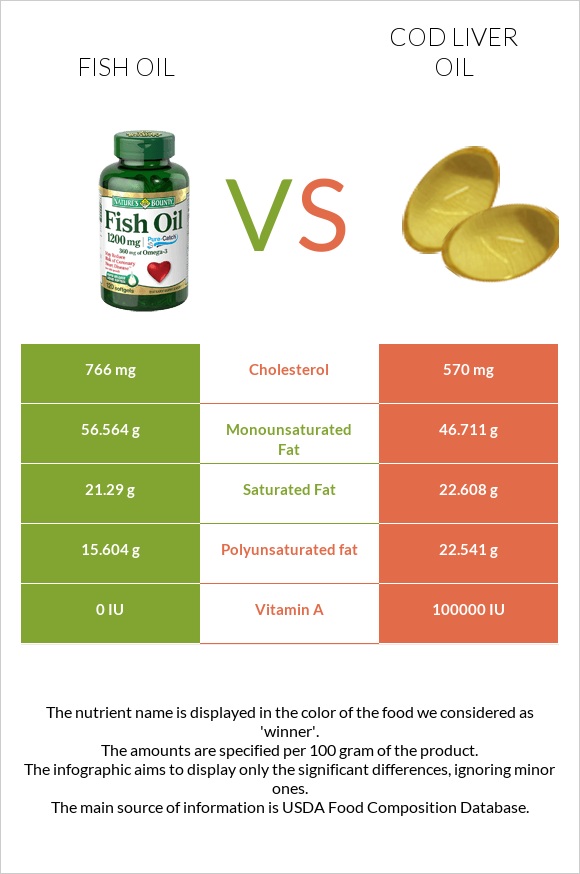Cod Liver Oil vs. Castor Oil: Shocking Differences You Need to Know
Are you looking for natural remedies to boost your health and well-being? You’ve likely come across cod liver oil and castor oil, both hailed for their potential benefits. But while they both originate from natural sources, the similarities end quickly. This article dives deep into the shocking differences between cod liver oil and castor oil, helping you understand their unique properties, uses, and potential side effects. We’ll explore everything from their origins to their impact on your body, so you can make informed decisions about which, if either, is right for you.
Understanding the Basics: What Are Cod Liver Oil and Castor Oil?
Before we delve into the differences, let’s establish a foundational understanding of each oil:
Cod Liver Oil: Extracted from the livers of codfish, this oil is a rich source of essential nutrients, primarily:
- Omega-3 fatty acids (EPA and DHA)
- Vitamin A
- Vitamin D
Castor Oil: Derived from the seeds of the Ricinus communis plant (castor bean), castor oil is primarily composed of ricinoleic acid, a monounsaturated fatty acid.
Key Differences: Cod Liver Oil vs. Castor Oil
The differences between these two oils are significant, influencing their uses and how they impact your body. Here’s a breakdown:
Source and Composition:
- Cod Liver Oil: Animal-based; rich in Omega-3s, Vitamin A, and Vitamin D.
- Castor Oil: Plant-based; primarily ricinoleic acid.
Primary Uses:
- Cod Liver Oil: Primarily used for supporting overall health, including:
- Boosting immune function
- Supporting heart health
- Improving brain function
- Strengthening bones
- Reducing inflammation
- Castor Oil: Primarily used for:
- Laxative effects
- Skin and hair care
- Inducing labor (under medical supervision)
- Cod Liver Oil: Primarily used for supporting overall health, including:
How They Work:
- Cod Liver Oil: Works by providing essential nutrients that the body can’t produce itself, supporting various bodily functions.
- Castor Oil: Primarily acts as a stimulant laxative, increasing the movement of the intestines. It’s also believed to have anti-inflammatory and moisturizing properties when applied topically.
Method of Consumption/Application:
- Cod Liver Oil: Typically taken orally as a supplement (capsules or liquid).
- Castor Oil: Can be taken orally (for laxative effects, but cautiously) or applied topically to the skin and hair.
Potential Side Effects:
- Cod Liver Oil: Generally safe when taken as directed. Potential side effects can include:
- Fishy burps
- Nausea
- Vitamin A and D toxicity (with excessive intake)
- Castor Oil:
- Oral use can cause:
- Cramping
- Diarrhea
- Nausea
- Topical use can sometimes cause:
- Skin irritation
- Allergic reactions
- Oral use can cause:
- Cod Liver Oil: Generally safe when taken as directed. Potential side effects can include:
Benefits of Cod Liver Oil (Highlights)
- Rich in Omega-3s: Supports heart health, brain function, and reduces inflammation.
- Vitamin D Boost: Crucial for bone health, immune function, and mood regulation.
- Vitamin A Source: Essential for vision, immune function, and skin health.
Benefits of Castor Oil (Highlights)
- Natural Laxative: Relieves constipation (use with caution).
- Skin Moisturizer: Can hydrate and soothe dry skin.
- Hair Growth Stimulant (Anecdotal): Some people use it to promote hair growth, though scientific evidence is limited.
Risks and Considerations
- Cod Liver Oil:
- Quality Matters: Choose reputable brands to ensure purity and avoid contaminants.
- Dosage is Key: Excessive intake of Vitamin A and D can be harmful.
- Consult Your Doctor: Especially if you’re taking blood thinners.
- Castor Oil:
- Oral Use: Should only be used for occasional constipation relief and under medical supervision.
- Pregnancy: Avoid oral use during pregnancy unless directed by a healthcare professional, as it may induce labor.
- Skin Sensitivity: Perform a patch test before applying topically to a large area.
Which Oil is Right for You?
The choice between cod liver oil and castor oil depends entirely on your health goals and needs. If you’re looking to:
- Improve overall health, support heart health, and boost your immune system, cod liver oil might be a good choice.
- Relieve constipation or address skin and hair concerns, castor oil might be worth exploring (with caution and proper usage).
Always consult with your doctor or a qualified healthcare professional before starting any new supplement or treatment, especially if you have any underlying health conditions or are taking other medications.
Conclusion: Making an Informed Choice
Cod liver oil and castor oil are distinct substances with unique properties and applications. Understanding the shocking differences in their composition, uses, and potential side effects is crucial for making an informed decision. While cod liver oil primarily offers nutritional support, castor oil focuses on specific therapeutic effects. Consider your individual needs and consult with a healthcare professional to determine which, if either, is the right choice for you.
Frequently Asked Questions (FAQs)
1. Can I take cod liver oil and castor oil together?
- While there’s no inherent contraindication, combining them isn’t typically recommended. Their uses are very different. Consult a doctor to discuss if your specific health needs might benefit from both.
2. Is castor oil safe for children?
- Oral use of castor oil is generally not recommended for children without medical supervision. Topical use is generally considered safe but always test a small area first.
3. How much cod liver oil should I take daily?
- Dosage varies depending on the product and individual needs. Always follow the manufacturer’s instructions or consult your doctor.
4. Does castor oil help with hair growth?
- There’s anecdotal evidence suggesting castor oil can promote hair growth, but scientific evidence is limited. More research is needed to support these claims.
5. Can I use cod liver oil on my skin?
- Yes, some people use cod liver oil topically for skin conditions due to its Vitamin A and D content and omega-3 fatty acids. However, consult a dermatologist first.




